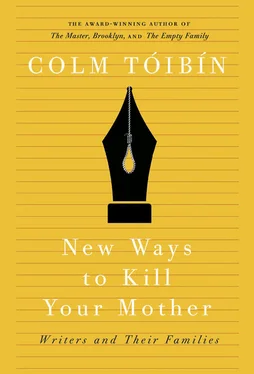Baldwin moved to Paris in November 1948 when he was twenty-four. ‘I left America,’ he wrote in 1959, ‘because I doubted my ability to survive the fury of the color problem here… I wanted to prevent myself from becoming merely a Negro; or, even, merely a Negro writer.’ In these years it occurred to him that while he was a stranger in Europe, he was not, as he had supposed, such a stranger in his own country. In one essay, describing life in a Swiss village, he wrote:
No road whatever will lead Americans back to the simplicity of this European village where white men still have the luxury of looking on me as a stranger. I am not, really, a stranger any longer for any American alive. One of the things that distinguishes Americans from other people is that no other people has ever been so deeply involved in the lives of black men, and vice versa.
In his introduction to Nobody Knows My Name , published in 1961, Baldwin wrote of his stay in France: ‘The question of who I was had at last become a personal question.’ In one of the essays in that book he described attending the Conference of Negro-African Writers and Artists in Paris in 1956 and finding an enormous gap between himself and the writers who had come from Africa and the Caribbean:
For what, at bottom, distinguished the Americans from the Negroes who surrounded us, men from Nigeria, Senegal, Barbados, Martinique… was the banal and abruptly quite overwhelming fact that we had been born in a society which, in a way quite inconceivable for Africans, and no longer real for Europeans, was open, and, in a sense which has nothing to do with justice or injustice, was free. It was a society, in short, in which nothing was fixed and we had therefore been born to a greater number of possibilities, wretched as these possibilities seemed at the instant of our birth. Moreover, the land of our forefathers’ exile had been made, by that travail, our home.
Baldwin summed up the result of his experience in France: ‘I found myself, willy-nilly, alchemized into an American the moment I touched French soil.’
The realization that he was an American, albeit one who came into being through alchemy, had a profound impact on Baldwin not only as a political thinker and essayist, but as an artist. It allowed him to write two masterpieces — Giovanni’s Room and Another Country — in which the souls of white people are examined with sympathy and tenderness; it allowed him to formulate a credo, as an artist who wrote also about black people, that their fate should not be predetermined by their colour but by the intimate spaces hidden in their souls. Our failure to love with due care became his subject; his genius was to spread that failure wide, make it an existential problem, almost a religious one. It also allowed him to realize that the history of black America belonged to whites as much as to blacks and that the ‘black-white experience [in America] may prove of indispensable value to us in the world we face today. This world is white no longer, and it will never be white again.’
Thus when William Styron published The Confessions of Nat Turner in 1967 and was attacked by African-American critics for stealing the voice of a slave for his fiction, he was defended by Baldwin: ‘He has begun the common history — ours.’ Later, Baldwin told the Paris Review : ‘I admired him for confronting it, and the result… He writes out of reasons similar to mine — about something that hurt him and frightened him.’
Although there are moments in Baldwin’s speeches and writings that are angrier and more sectarian than the main body of his writing, his work seems astonishingly wise and forgiving, constantly ready to include the other side, insisting that the complex fate of being an American involved America in its both rich and hidden diversity and its both gnarled and noble history. It appears that such wisdom and sense of forgiveness came from how he lived, from his walking the streets of European cities knowing that he was not at home and slowly realizing where home was. Home, oddly enough, was the United States.
On his first trip to Kenya, before he went to Harvard Law School, Barack Obama, who was twenty-seven, sensed his father’s ghostly presence in the streets of Nairobi:
I see him in the schoolboys who run past us, their lean, black legs moving like piston rods between blue shorts and oversized shoes. I hear him in the laughter of the pair of university students who sip sweet creamed tea and eat samosas in a dimly lit teahouse. I smell him in the cigarette smoke of the businessman who covers one ear and shouts into a pay phone; in the sweat of a day laborer who loads gravel into a wheelbarrow, his face and bare chest covered with dust. The Old Man’s here, I think, although he doesn’t say anything to me. He’s here, asking me to understand.
In these chapters of his autobiography, as Obama attempted to understand his Kenyan heritage, there is a sharp feeling that this was an interlude in the life of an earnest American, at times a form of tourism, at other times a serious effort to resolve the most complex matters of identity and selfhood. There is a moment when he sat by the graves of his ancestors and wept:
When my tears were finally spent, I felt a calmness wash over me. I felt the circle finally close… I saw that my life in America — the black life, the white life, the sense of abandonment I’d felt as a boy, the frustration and hope I’d witnessed in Chicago — all of it was connected with this small plot of earth an ocean away, connected by more than the accident of a name or the color of my skin. The pain I felt was my father’s pain. My questions were my brothers’ questions. Their struggle, my birthright.
This passage displays the difference between Baldwin’s sensibility and that of Obama. Whereas Baldwin sought to make distinctions, Obama always wants to make connections; his urge is to close circles even when they don’t need to be closed or the closure is too neat to be fully trusted. Whereas Baldwin longed to disturb the peace, create untidy truths, Obama was slowly becoming a politician.
Despite his best effort to reconcile his own life at home with that of his Kenyan father, the chapters about Kenya in Dreams from My Father show Obama puzzled and ill at ease. Later, in his book The Audacity of Hope , he moved closer to the truth when he described his wife’s admission on a flight back from Kenya to Chicago that ‘she was looking forward to getting home. “I never realized just how American I was,” she said. She hadn’t realized just how free she was — or how much she cherished that freedom.’
Just as Obama, in his increasing urge to inspire, a necessary aspect of his calling perhaps, often seeks a rhetoric free of bitterness and high on healing, Baldwin, in his urge to speak difficult truths, to tell white people what they least wished to hear, sometimes moved towards a tone that was almost shrill. In his great good humour, however, he would perhaps enjoy more than anyone else reading this passage now from an essay written by him in 1965:
I remember when the ex-Attorney General, Mr Robert Kennedy, said it was conceivable that in 40 years in America we might have a Negro President. That sounded like a very emancipated statement to white people. They were not in Harlem when this statement was first heard. They did not hear the laughter and bitterness and scorn with which this statement was greeted… We were here for 400 years and now he tells us that maybe in 40 years, if you are good, we may let you become President.
Obama, running for President forty-three years later, just three years too late to fulfil what Robert Kennedy saw as conceivable, and Baldwin saw as far too late, ends Dreams from My Father with the phrase, ‘I felt like the luckiest man alive.’ Later, when he won his first election to the US Senate, he wrote: ‘Still, there was no point in denying my almost spooky good fortune. I was an outlier, a freak; to political insiders, my victory proved nothing.’
Читать дальше












